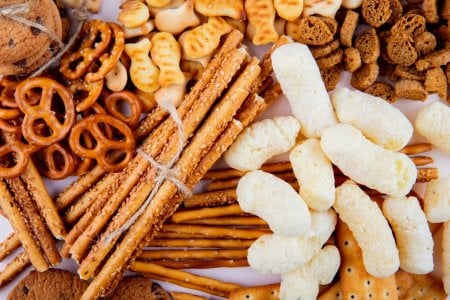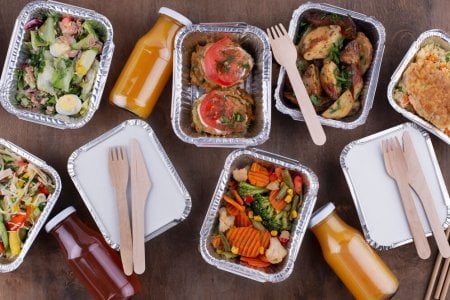Are your favourite snacks and treats now considered luxuries? Here's why many Australians are dramatically cutting back!
By
- Replies 32
With the cost-of-living crisis continuing unabated, many Aussies are looking for ways to make their weekly budget stretch that bit further – and one way is forgoing snacks and ‘treats’.
A recent survey revealed that some Australians are treating the likes of chocolates, desserts and premium nuts as luxury items now, just as we treat other things like fancy restaurants and overseas vacations.
67-year-old Kerry Moore from Queensland is just one of many people on the lower end of the income scale feeling the pinch. He used to enjoy having breakfast in the morning but says he can no longer afford it and has now resorted to munching on muesli for dinner.
Meanwhile, rather than purchase things like chocolate and takeaway foods, he is now making his own cakes, bread, and frozen chips to save money.
'I don't have breakfast now. I can't afford that, so I cut that out. I'll have lunch, and then at night-time, I might have some muesli. That's it,' he says.'There are times I've had to go without my medication. I make my own bread. I make my own muesli. When I'm cooking something, I'll buy the cheapest stuff.'
Sarah Connelly, the director of Product of the Year, the company that commissioned the NielsenIQ survey, said this new research reflects a dramatic change in the way we're going about our weekly grocery shopping.
'Whilst snacks and treats were commonplace in the shopping trolley before living expenses started to increase exponentially, these are now classed as luxury items rather than a need, with many shoppers viewing snacks as a low priority when it comes to feeding the family.'
Numerous other money-saving tactics are being employed, however. Many Australians are now using cost-saving techniques, such as switching to home brands, buying cheaper alternatives, cooking more at home, eating leftovers and cutting back on food delivery and takeaway.
When Kerry goes shopping, he chooses cheaper cuts of meat, switches to cheaper brands, and seeks out the best deals he can find. 'I used to eat steak, but I can't have steak any more,' he says.
'I'll squeeze the mince out of sausages rather than pay the high prices for steak and make my own sausage rolls just to save a few bucks.'
Most Aussies know all too well how quickly the prices of goods and services can rise, so this kind of financial and dietary moderation is an important skill to learn. While you don't need to go to extremes like Mr Moore has, it might be a good time to review your spending habits and make realistic budgeting goals.
Take a look at where your money is going, especially when it comes to small transactions like supermarket snacks, takeaway coffees, and online purchases.

So, while higher costs may mean the end of impulse purchases for now, most Australians can still afford to treat themselves occasionally without breaking the bank with a bit of creative budgeting. What do you think of this story, members? Share your thoughts and comments below!
A recent survey revealed that some Australians are treating the likes of chocolates, desserts and premium nuts as luxury items now, just as we treat other things like fancy restaurants and overseas vacations.
67-year-old Kerry Moore from Queensland is just one of many people on the lower end of the income scale feeling the pinch. He used to enjoy having breakfast in the morning but says he can no longer afford it and has now resorted to munching on muesli for dinner.
Meanwhile, rather than purchase things like chocolate and takeaway foods, he is now making his own cakes, bread, and frozen chips to save money.
'I don't have breakfast now. I can't afford that, so I cut that out. I'll have lunch, and then at night-time, I might have some muesli. That's it,' he says.'There are times I've had to go without my medication. I make my own bread. I make my own muesli. When I'm cooking something, I'll buy the cheapest stuff.'
Sarah Connelly, the director of Product of the Year, the company that commissioned the NielsenIQ survey, said this new research reflects a dramatic change in the way we're going about our weekly grocery shopping.
'Whilst snacks and treats were commonplace in the shopping trolley before living expenses started to increase exponentially, these are now classed as luxury items rather than a need, with many shoppers viewing snacks as a low priority when it comes to feeding the family.'
Numerous other money-saving tactics are being employed, however. Many Australians are now using cost-saving techniques, such as switching to home brands, buying cheaper alternatives, cooking more at home, eating leftovers and cutting back on food delivery and takeaway.
When Kerry goes shopping, he chooses cheaper cuts of meat, switches to cheaper brands, and seeks out the best deals he can find. 'I used to eat steak, but I can't have steak any more,' he says.
'I'll squeeze the mince out of sausages rather than pay the high prices for steak and make my own sausage rolls just to save a few bucks.'
Most Aussies know all too well how quickly the prices of goods and services can rise, so this kind of financial and dietary moderation is an important skill to learn. While you don't need to go to extremes like Mr Moore has, it might be a good time to review your spending habits and make realistic budgeting goals.
Take a look at where your money is going, especially when it comes to small transactions like supermarket snacks, takeaway coffees, and online purchases.
Key Takeaways
- New research reveals half of Australians are treating snacks and indulgences as luxury items and cutting back on purchases due to rising grocery prices.
- Many Australians are opting for cost-saving tactics like switching to home brands, eating leftovers, and cutting back on takeaways and food delivery.
Last edited by a moderator:









